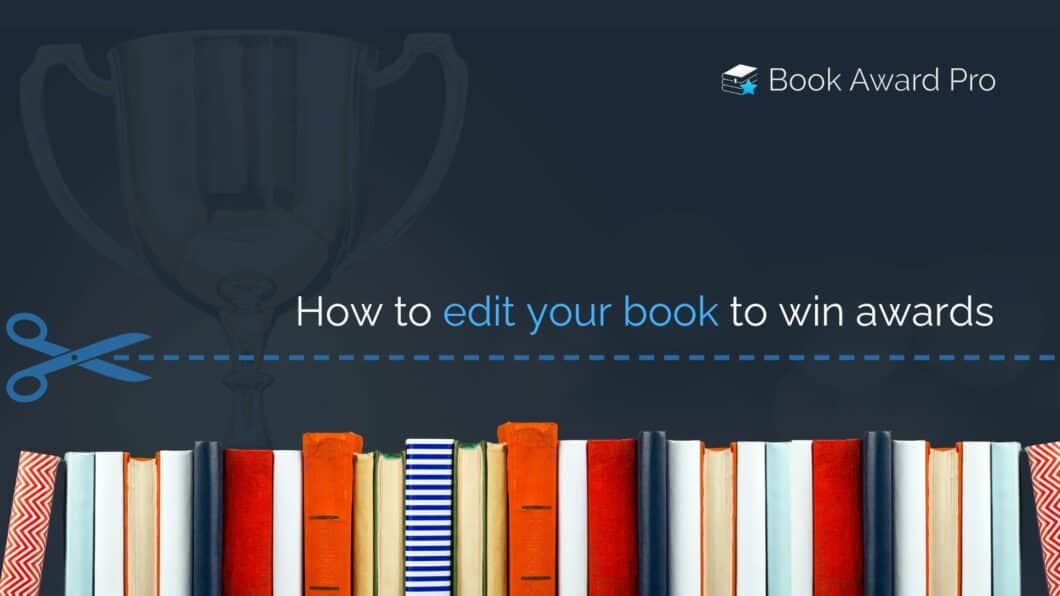How to edit your book to win awards

Book Award Pro
When you’ve finished writing your book, the two factors that will determine its success are editing and marketing. You might have a fantastic, ground-breaking story, but if it’s marketed poorly, no one outside of your immediate friends and family will hear about it. Equally, you can promote it expertly, but without good editing, it will never be as good as it could be. Developmental issues, errors, and unpolished writing will lead to poor reviews and ultimately limit its appeal.
We all know that winning awards is one of the best ways to promote your book, stand out, and sell more copies. But the chances of winning an award for a poorly edited book are minuscule. So, how much should you focus on awards while editing? And is it possible to edit your book to make winning an award more likely?
How to edit your book to win awards
Follow these steps to edit your book for award-winning success:
1. Focus on the current stage
You should have your book edited regardless of whether you’re submitting it for awards. But is there a particular way to do so that increases your chances of winning?
In some ways, whatever position you’re in with your novel, it’s best to focus on your current stage and not look too far ahead. The editing steps won’t change drastically, and it’s not a good idea to write something with a particular award in mind or to try adapting it based on what you think might appeal to a certain one.
Book Award Pro matches your book to appropriate awards for its genre, style, and target audience, doing the hard work for you. As an author, you should focus on writing while you’re writing, editing while you’re editing, and marketing while you’re marketing. When you’re in the writing stage, consider only making the best product possible and let the experts connect you to awards and promotional tools later.
2. Increase your chances of winning a book award
Though you shouldn’t look too far ahead or write with awards in mind, there are specific things you can focus on to increase your chances of winning a book award:
Genre
Knowing your genre is a vital part of both editing and marketing. Readers, especially readers of independent authors, know what they like and often read exclusively from particular genres. They’re astute buyers who have certain expectations of books that are marketed within certain categories.
When you submit your book to an award, it’s highly likely that it will be genre-specific. If you have a mystery story, it will be up against other mystery stories. This is helpful for judges and readers, but it can also increase your sales as an author: blurbs that name prestigious, genre-specific awards boosted CTRs (click-through rates) up to 25%.
Learning about your genre is an ongoing process. If you’re a horror writer, it’s important to read as much horror as possible—both the classics and modern horror fiction. While editing, ask yourself if you’ve met your readers’ expectations. Do you adhere to conventions? Would a reader who hadn’t read your blurb know your book’s genre just from the first few chapters?
This doesn’t mean you can’t introduce elements from more than one genre, nor that you have to write rigidly or formulaically. Your crime thriller might have a romance subplot; your fantasy novel could be set in an ancient time. But your predominant genre should be clear and hit the necessary beats to satisfy readers.
Uniqueness
Equally, it’s also critical to make sure your book is unique! Precisely because your book will be up against others in the same genre, it can’t be a carbon copy of every other novel in the category. Writing isn’t a paint-by-numbers game, and judges and publishers are often—above all—bored. Grab them with something unexpected. Have an individual selling point, break conventions, and work with editors who increase your confidence in your new ideas.
This is another reason it’s important to read modern books in your genre—to know your competition. Is every historical fiction right now set in Ancient Rome? Are zombies the predominant threat in most science-fiction books?
Your ideas don’t all need to be 100% original (very few, debatably none, are), and I often warn authors against focusing on uniqueness above all else. It’s difficult to find the line between writing the tropes that readers care about and the ones they’re tired of, so do your research and edit scrupulously. Ask your editor how much experience they have in your genre, how much they read in it, and what they’re tired of seeing, then edit together accordingly.
Target audience
Similar to knowing your genre, it’s important to know your target audience. Awards are often, even if not explicitly stated, age-, gender-, and country-specific. Ask yourself who your ideal reader is. Who would enjoy your book, and likewise, who might not?
For example, it seems obvious that there are certain things that shouldn’t be included in children’s fiction, but often writers aren’t sure of what is and isn’t appropriate in young adult fiction. And remember that it isn’t just men who read science-fiction and horror—are your female characters three-dimensional? Can you add a twist? Does your book idea excite you?
Beta-readers are valuable assets for editing your book, particularly if there are subsections of your target audience in a demographic you don’t personally belong to. Ask them detailed questions about their reactions and listen to their advice!
Polishing
Your manuscript doesn’t need to be published for you to submit it to book awards, but it must be edited! Regardless of how long you’ve been an author or how many times you’ve revised it yourself, every writer needs a professional editor.
With an unpolished, unedited manuscript, you’re unlikely to win any awards. In my publishing work, I often discard manuscripts that are clearly unedited or contain typos without reading more than the first few paragraphs. An enormous number of manuscripts are submitted to publications and awards every day, so if it doesn’t feel as though the author has given much attention or concern to their book, readers and judges won’t either.
3. Find editors
Writing coaches and coach/editor hybrids can reduce the time and expense of the process, but you will still need to invest in the three different stages of editing:
Developmental editing
Developmental editing, sometimes called substantive or content editing, examines your story with a wide lens. A developmental editor will provide detailed feedback about what works and what doesn’t, focusing on the structure, characters, consistency, and thematic elements.
Think of it as taking apart a car engine. We’re looking for cracks, leaks, and checking the pistons. They’ll ask questions like: Is your character behaving the way you would expect them to in a certain scene? Is the climax dramatic enough? Have you left any storylines unresolved or created a plot hole? Should you introduce your antagonist earlier?
Line editing
Line, or stylistic editors, will polish your writing itself. They’ll focus on enhancing your book on a sentence-by-sentence and word-by-word level, making it a professional, consistent, and fluid finished product.
Proofreading
The final step of the editing process is proofreading. Proofreaders will ensure that no typos, grammatical, or spelling mistakes make it into the final version of your book. If a judge sees multiple typos on the first page of your manuscript, they’re unlikely to take it seriously. Hire an independent proofreader—don’t think you can do it yourself! It’s hard to catch your own mistakes, and you’ll feel more confident having had an independent set of eyes to ensure your book is perfect!
4. Improve your brand through story marketing
Story marketing involves connecting with the audience on an emotional level. Research conducted by Harvard Business Review revealed exceptional results when companies (in your case, authors) market their products to elicit emotion.
So instead of just instructing the potential readers to buy your book, rather connect with them on an emotional level. Instead of making it about you, make it about them. One of the strongest subconscious drivers of human behavior is the desire for safety.
When you showcase your nominations and awards online, people feel a sense of safety. This third-party validation dissolves their fears of wasting their money. They feel a sense of safety now, and with that comes trust in you and your products.
In addition, those who already bought your book would feel proud about their purchase. They now have the power of “I told you so,” meaning they will feel more empowered to recommend the book to their acquaintances.
Now imagine you somehow skipped the editing process and stumbled upon some shady organization that hands out book awards willy-nilly. Imagine the reputational damage you would sustain when these excited buyers open their new proud purchase, only to discover it’s riddled with mistakes.
From a story marketing point of view, that’s why it’s vital to have your book edited professionally and make sure that the competitions you enter are vetted, as is the case through Book Award Pro.
Guest post from Denis Caron and Weekend Publisher
Denis and his team at Weekend Publisher help authors write award winning books that attract loyal readers. You can learn more about his services at weekendpublisher.com


